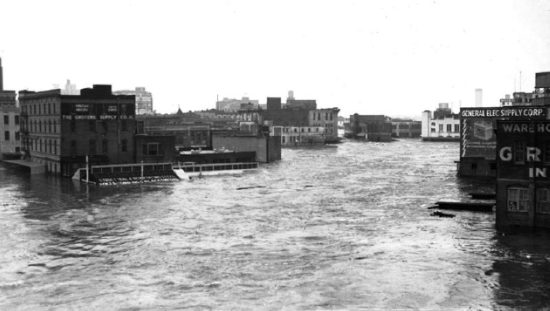Why Houston Flooding Isn’t a Sign of Climate Change
August 28th, 2017
In the context of climate change, is what we are seeing in Houston a new level of disaster which is becoming more common?
The flood disaster unfolding in Houston is certainly very unusual. But so are other natural weather disasters, which have always occurred and always will occur.
(By the way, making naturally-occurring severe weather seem unnatural is a favorite tactic of Al Gore, whose new movie & book
An Inconvenient Sequel [ currently #21,168 in Kindle] is dismantled in my new e-book,
An Inconvenient Deception [currently #399]).
Floods aren’t just due to weather
Major floods are difficult to compare throughout history because the ways in which we alter the landscape. For example, as cities like Houston expand over the years, soil is covered up by roads, parking lots, and buildings, with water rapidly draining off rather than soaking into the soil. The population of Houston is now ten times what it was in the 1920s. The Houston metroplex area has expanded greatly and the water drainage is basically in the direction of downtown Houston.
There have been many flood disasters in the Houston area, even dating to the mid-1800s when the population was very low. In December of 1935 a massive flood occurred in the downtown area as the water level height measured at Buffalo Bayou in Houston topped out at 54.4 feet.

Downtown Houston flood of 1935.
By way of comparison, as of 6:30 a.m. this (Monday) morning, the water level in the same location is at
38 feet, which is still 16 feet lower than in 1935. I’m sure that will continue to rise.
Are the rainfall totals unprecedented?
Even that question is difficult to answer. The exact same tropical system moving at, say, 15 mph might have produced the same total amount of rain, but it would have been spread over a wide area, maybe many states, with no flooding disaster. This is usually what happens with landfalling hurricanes.
Instead, Harvey stalled after it came ashore and so all of the rain has been concentrated in a relatively small portion of Texas around the Houston area. In both cases, the atmosphere produced the same amount of rain, but where the rain lands is very different. People like those in the Houston area don’t want all of the rain to land on them.
There is no aspect of global warming theory that says rain systems are going to be moving slower, as we are seeing in Texas. This is just the luck of the draw. Sometimes weather systems stall, and that sucks if you are caught under one. The same is true of high pressure areas; when they stall, a drought results.
Even with the system stalling, the greatest multi-day rainfall total as of 3 9 a.m. this Monday morning is
just over 30 39.7 inches, with many locations recording over 20 inches. We should recall that Tropical Storm Claudette in 1979 (a much smaller and weaker system than Harvey) produced a 43 inch rainfall total in only 24 hours in Houston.
Was Harvey unprecedented in intensity?
In this case, we didn’t have just a tropical storm like Claudette, but a major hurricane, which covered a much larger area with heavy rain. Roger Pielke Jr. has pointed out that the U.S. has had
only four Category 4 (or stronger) hurricane strikes since 1970, but in about the
same number of years preceding 1970 there were 14 strikes. So we can’t say that we are experiencing more intense hurricanes in recent decades.
Going back even earlier, a Category 4 hurricane struck Galveston in 1900, killing between 6,000 and 12,000 people. That was the greatest natural disaster in U.S. history.
And don’t forget, we just went through an unprecedented length of time – almost 12 years – without a major hurricane (Cat 3 or stronger) making landfall in the U.S.
http://www.drroyspencer.com






